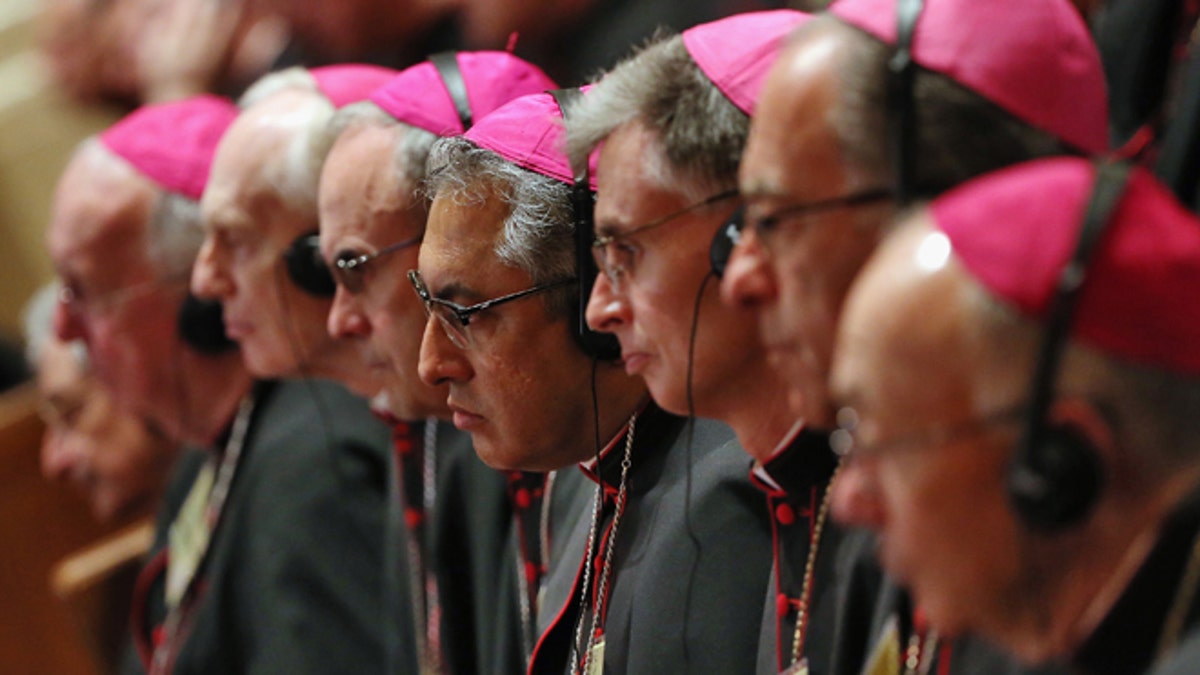
Bishops listen as Pope Francis speak during the midday prayer service at the Cathedral of St. Matthew in Washington, Wednesday, Sept. 23, 2015. (Mark Wilson/Pool Photo via AP)
NEW YORK (AP) – Pope Francis praised American bishops on Wednesday for their "generous commitment" to helping victims of clergy sex abuse, drawing an angry rebuke from advocates who said the bishops acted only under the threat of hundreds of lawsuits.
Addressing church leaders in a prayer service at the Washington cathedral, Francis said they had faced the crisis "without fear of self-criticism and at the cost of mortification and great sacrifice."
"I realize how much the pain of recent years has weighed upon you, and I have supported your generous commitment to bring healing to victims — in the knowledge that in healing we, too, are healed — and to work to ensure that such crimes will never be repeated," the pope said to loud applause from the bishops.
But the Survivors Network of Those Abused by Priests said the bishops had displayed "cowardice and callousness" in response to victims who came forward and they "hide behind expensive lawyers and public relations professionals" instead of fully confronting the scope of the problem within the church. Anne Barrett Doyle, co-director of BishopAccountability.org, an advocacy group that collects records on abusive priests from around the world, called the pope's remarks "distressing and quite off-base."
A Vatican spokesman, the Rev. Federico Lombardi, defended Francis' comments, saying it was appropriate to recognize the bishops' reforms in response to the scandal given the U.S. church is now a model for other countries to follow.
"I am not surprised there are critics that are not happy, but this is not the first time," he said.
He said the pope cannot simply keep beating down the bishops but must offer them words of encouragement.
The abuse crisis erupted in 2002 with the case of one pedophile priest in the Archdiocese of Boston, then spread nationwide. The revelations in Boston, about guilty priests kept in ministry without any warning to parents or police, persuaded thousands of people across the country to come forward with abuse claims, prompted grand jury investigations in several states and compelled the bishops to take an inventory of how every American diocese had dealt with perpetrators and victims going back decades.
Under enormous public pressure, the U.S. Conference of Catholic Bishops pledged to oust any guilty clergy from church work or from the priesthood. Hundreds of priests were removed from ministry, and bishops made multimillion-dollar settlements with victims. Dioceses conducted background checks of priests and workers, trained them to identify abusive behavior and put in place other safeguards for children.
However, the scandal persists. In 2011, a grand jury accused the Archdiocese of Philadelphia, then led by Cardinal Justin Rigali, of keeping about three dozen guilty priests in parishes. Rigali's successor, Archbishop Charles Chaput, has worked to restore trust in the archdiocese, which Francis will visit this weekend.
Three other dioceses — Gallup, New Mexico; Milwaukee; and St. Paul and Minneapolis — are in bankruptcy court trying to limit settlements with victims. The Archdiocese of St. Paul and Minneapolis is being prosecuted on charges of failing to protect children from a now-convicted priest, and its archbishop, John Nienstedt, and one of his auxiliary bishops stepped down this year.
Archbishop Joseph Kurtz, president of the bishops' conference, said the bishops understood that "we continue to need to do more in recognizing the pain" of victims and said he saw the pope's comments as encouragement to continue reaching out to them.
Francis announced plans in June to create a tribunal to hear cases of abuse of office by bishops over failures in handling sex abuse cases. But there are no signs it will be set up any time soon.
While the tribunal marks the biggest step taken to address accountability among bishops who covered up for abuse, Francis also has a history of sounding tone-deaf about the problem. He once complained the church had been unfairly singled out for criticism and defended the measures it had taken to address it, leading victims groups to question whether he really "got it" about abuse.
His comments Wednesday further cemented that impression, especially given the last papal visit to the U.S., Benedict XVI's 2008 trip, was dominated by the issue and was highlighted with Benedict's first meeting with victims.
Francis, too, is expected to meet with victims on this trip, though church officials have said any such meeting will be announced only after it has taken place.
Like us on Facebook

